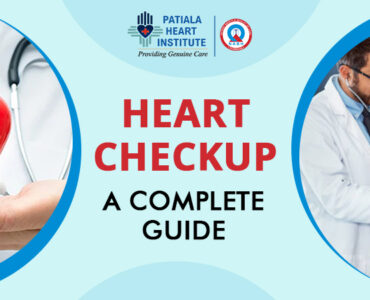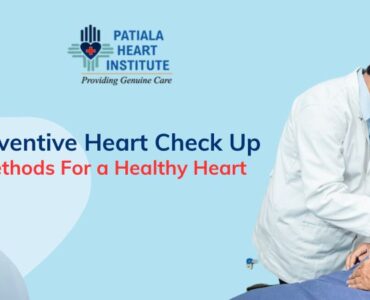According to the World Health Organization, Cardiovascular diseases (CVDs) pose a grave threat to global health, claiming an estimated 17.9 million lives each year.
With heart disease being the leading cause of mortality worldwide, it is important to prioritize heart health and make positive changes in our daily lives. The incidence of cardiovascular diseases in India is among the highest in the world.
According to the National Center for Biotechnology Information (NCBI), cardiovascular illnesses affect Indians ten years sooner than people in Western countries. Moreover, up to 3 million individuals annually succumb to heart attacks, strokes, and cardiac arrests in India. What’s even more concerning is that approximately 40% of those affected are under the age of 55.
Cardiovascular Diseases and Risk Factors
Cardiovascular diseases (CVD) are a group of diseases and disorders that affect the heart and blood vessels. These conditions can include coronary artery disease, heart attacks, arrhythmias, heart failure, congenital heart defects, and heart valve disease, among others.
Risk factors such as hypertension, high cholesterol, diabetes, smoking, and family history can significantly contribute to the development of various heart diseases. Recognizing these risk factors is crucial for prevention and early intervention of heart diseases.
Impact of Lifestyle on Heart Health
Lifestyle plays a pivotal role in maintaining heart health. Implementing simple yet effective lifestyle modifications and adopting heart-healthy habits can help prevent heart diseases and promote optimal heart health.
Here are some tips from renowned cardiologists to help you on your journey towards a heart-healthy lifestyle to lower the risk of heart disease:
Dietary do’s & don’ts for a healthy heart
When it comes to maintaining a healthy heart, a balanced diet is the key. The food you eat plays a significant role in determining your cardiovascular health. To ensure you have a healthy heart, focus on eating foods high in the nutrients, vitamins, and minerals your body needs while avoiding unhealthy fats, sodium, and added sugars.
Foods to include in your diet
Whole grains:
Incorporating whole grains, like oats, brown rice, quinoa, and whole wheat, into your diet helps lower cholesterol levels and maintain healthy blood pressure. They also offer a steady source of energy and can help control weight.
Fruits and vegetables:
Fruits and vegetables are packed with antioxidants, fiber, and other essential nutrients that can help lower blood pressure, improve cholesterol levels, and reduce inflammation. Aim for a variety of fruits and vegetables, including leafy greens, berries, citrus fruits, and cruciferous vegetables.
Lean protein:
Add lean sources of protein, such as beans, peas, legumes, and fish. These sources of protein are low in saturated fat and provide important nutrients like Omega-3 fatty acids, which have been shown to reduce the risk of heart disease.
Healthy fats:
Include sources of healthy fats, such as nuts, seeds, avocados, and olive oil. These foods help improve cholesterol levels, reduce inflammation, and support heart health.
Foods to limit or avoid
Processed and high-sodium foods:
Processed foods often contain high amounts of sodium, contributing to high blood pressure and increasing the risk of heart disease. Avoid packaged snacks, processed meats, canned soups, and fast food, as they have a high sodium content.
Trans fats and unsaturated fats:
These types of fats can raise LDL cholesterol levels, increasing the risk of heart disease. Limit the intake of foods like baked goods, fried foods, fatty meats, and full-fat dairy products.
Added sugar:
Excessive consumption of added sugar can lead to weight gain, diabetes, and an increased risk of heart disease. Limit sugary beverages, candies, and processed foods that are high in sugar content.
Regular physical exercise
Regular physical activity is a powerful tool for maintaining a healthy heart. Exercise directly impacts cardiovascular health in a number of ways. Exercise helps strengthen the heart muscles, improves blood circulation, lowers blood pressure, and reduces the risk of heart disease. It also helps manage weight, control cholesterol levels, and enhance overall well-being.
Types of exercise for a healthy heart
Aerobic exercise:
Activities such as jogging, cycling, swimming, brisk walking, and dancing are excellent for cardiovascular health. These activities regulate heart rate, improve oxygen intake, and strengthen the heart muscles.
Strength training:
Includes exercises involving weight, resistance bands, and bodyweight exercises. These exercises help build muscle mass, improve cardiovascular fitness, and enhance metabolism.
Flexibility exercise:
Incorporate flexibility exercises like stretching and yoga into your routine to improve muscle flexibility, posture, and joint mobility. It also helps in relaxation and stress reduction.
Incorporating physical activity into your daily routine is essential for maintaining a healthy heart and overall well-being.
Maintain a healthy weight
Maintaining a healthy weight is crucial for optimal heart health. Obesity is a significant risk factor for heart disease, as it increases the likelihood of developing conditions such as high blood pressure, high cholesterol levels, and type 2 diabetes. Excess weight puts additional strain on the heart and can lead to the buildup of plaque in the arteries, increasing the risk of heart attacks and strokes.
Maintaining a healthy weight can reduce the burden on your heart and lower the risk of cardiovascular disease. If you find achieving or maintaining a healthy weight challenging, consider seeking professional guidance. Registered dietitians, nutritionists, or healthcare professionals can provide personalized advice and support in developing a tailored weight management plan.
Take control of your weight and prioritize your heart health by seeking guidance from nutritionists and dietitians at Patiala Heart Institute. Schedule a consultation today and start your journey towards a healthier weight and a stronger heart.
Quit smoking
Smoking poses significant risks to heart health. It damages blood vessels, reduces oxygen supply to the heart, raises blood pressure, and promotes the buildup of plaque in the arteries. Smoking is a major cause of heart disease, including heart attacks and strokes. Quit smoking to improve your heart health and prevent heart disease.
Tips to quitting smoking
- Seek professional help from healthcare providers.
- Set a quit date and make a plan to deal with cravings and withdrawal symptoms.
- Find healthier alternatives to manage stress, such as exercise, meditation, or hobbies.
- Avoid triggers and environments that may tempt you to smoke.
- Get the support of family and friends to keep you motivated and accountable.
Limit Alcohol intake
Excessive alcohol consumption may have detrimental effects on your heart and overall health. Heavy alcohol consumption can lead to hypertension, weakened heart muscles, irregular heart rhythms, and an increased risk of heart failure. By avoiding or limiting alcohol, you can significantly reduce your risk of heart disease and promote a healthier lifestyle.
Tips to limit alcohol intake
- Limit intake to two drinks per day for men and one drink per day for women
- Be mindful of what constitutes a drink
- Choose low-alcohol or non-alcohol alternatives
- Avoid consumption of alcohol if you have a history of alcohol-related issues or certain medical conditions.
Regular Health Check-ups and Monitoring
Regular medical check-ups play a vital role in maintaining optimal cardiovascular health. These check-ups allow healthcare professionals to assess your overall well-being, detect early signs of potential heart problems, and provide appropriate interventions. By scheduling regular check-ups, you can stay proactive in protecting your heart and ensuring early detection and treatment of any underlying cardiovascular issues.
During your regular check-ups, your healthcare provider may monitor various key markers of heart health. These will include blood pressure, body weight, body mass index (BMI), cholesterol levels, blood sugar levels, and heart rhythms. These measurements provide important insights into your heart health and help identify any risk factors or abnormalities that may require further attention or intervention.
If you experience symptoms such as chest pain, shortness of breath, irregular heartbeats, or unexplained fatigue, it is crucial to consult a cardiologist promptly. Additionally, if you have a family history of heart disease, certain risk factors such as high blood pressure or diabetes, regular visits to a cardiologist are recommended for comprehensive cardiovascular evaluation and preventive care.
To consult the best cardiologists in Patiala, schedule an appointment at Patiala Heart. Our experienced cardiologists are dedicated to providing personalized care, advanced diagnostics, and comprehensive treatment options to ensure your heart health is in the best hands. Take a proactive step towards a healthy heart by contacting Patiala Heart today.
What Are The Signs of An Unhealthy Heart?
Here are some of the early signs that may indicate an unhealthy heart:
- Fatigue and weakness
- Shortness of breath
- Chest pain
- Irregular heartbeat
- Dizziness
- Swelling in legs, ankles, feet, or abdomen
Are Antidepressants Safe For Cardiac Patients?
The safety of antidepressants for cardiac patients depends on various factors, and you should consult your cardiologist before taking any antidepressants. Some antidepressants may pose a risk for certain cardiac conditions, interact with specific medications, or have an increased risk of arrhythmias. Hence, it is important to discuss your cardiac history, current medications, and symptoms with your healthcare provider so that he can assess the potential benefits and risks before recommending an appropriate treatment plan.







